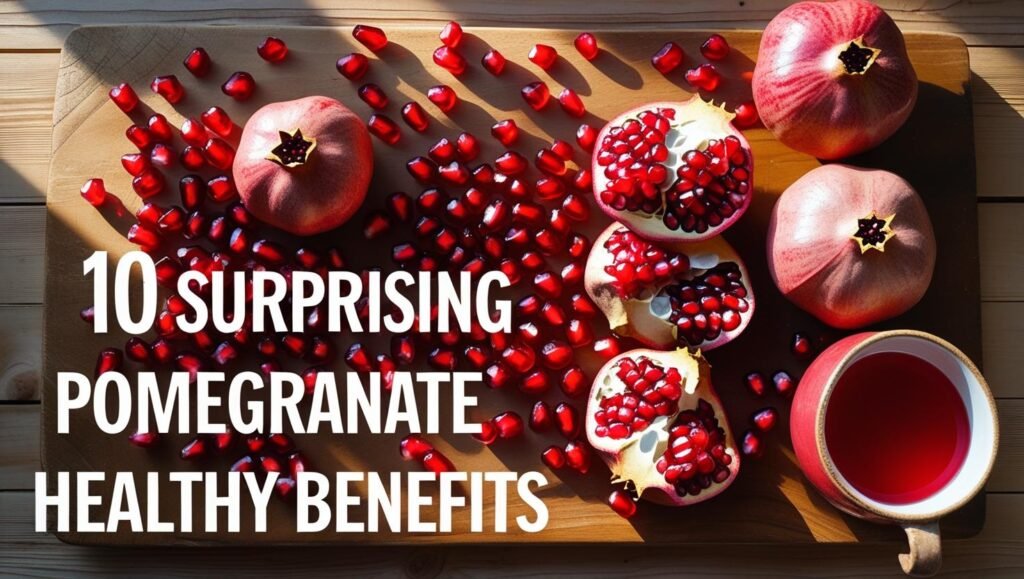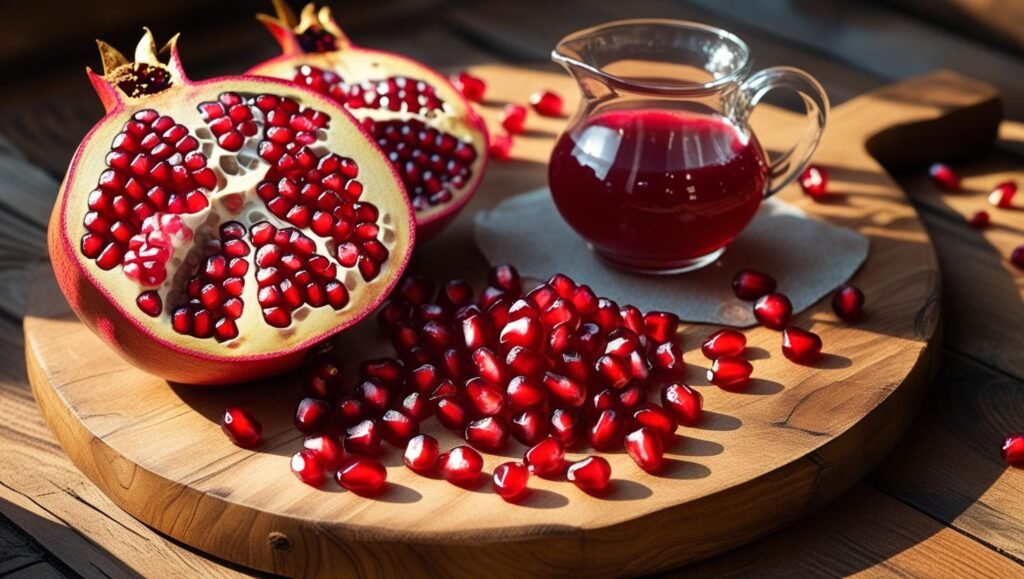
Explore 10 science‑backed pomegranate health benefits—from heart, brain & skin health to immunity, traditional uses, safe dosage & more.
1. Pomegranate Fruit and Its Bioactive Health Compounds
1.1 Polyphenols That Power Pomegranate’s Health Benefits
Pomegranate fruit is rich in polyphenols, including ellagitannins, anthocyanins, and flavonols. These plant compounds are responsible for its deep red color and potent antioxidant effects. Ellagitannins, in particular, convert into urolithins during digestion — compounds shown to support anti-aging, gut health, and mitochondrial function.
1.2 Antioxidant Properties That Neutralize Free Radicals
The antioxidant power of pomegranate fruit ranks among the highest of all fruits. It combats oxidative stress by neutralizing free radicals, protecting cellular DNA and reducing inflammation — factors involved in aging and chronic disease. These effects are crucial for heart health, skin vitality, and brain protection.
Related: How emotions affect your physical health
1.3 Anti-Inflammatory Properties That Reduce Chronic Risk
Multiple studies show that pomegranate consumption significantly lowers inflammatory markers such as C-reactive protein (CRP) and interleukin-6. This makes it an effective dietary strategy for fighting low-grade, chronic inflammation that drives diseases like diabetes, obesity, and heart disease.
Related: Why bones getting weak without warning
Ranking Element:
Scientific Snapshot: A 2020 meta-analysis published in Phytotherapy Research found that daily pomegranate juice consumption significantly improved antioxidant status and reduced CRP levels in adults over 8 weeks. These results align with polyphenol-driven benefits shown in over 25 human trials.
2. Heart Health Benefits of Pomegranate Juice
2.1 Reducing Systolic Blood Pressure Naturally
Pomegranate juice has been shown to significantly lower systolic blood pressure by enhancing nitric oxide production and relaxing blood vessels. This effect reduces the workload on the heart and decreases the risk of cardiovascular events such as heart attack and stroke.
Related: Cooking oils and heart disease myths
2.2 Lowering LDL Bad Cholesterol and Improving Lipid Profiles
Clinical studies suggest that daily intake of pomegranate juice can reduce LDL (“bad”) cholesterol while preserving HDL (“good”) cholesterol. This dual effect helps prevent plaque buildup in arteries, improving overall lipid health and reducing atherosclerosis risk.
Related: Why you need vitamin E for daily health
2.3 Slowing Atherosclerosis Progression
Long-term studies reveal that pomegranate polyphenols inhibit the oxidation of LDL cholesterol, which is a major contributor to plaque formation in arteries. As a result, regular consumption can help slow or even reverse early atherosclerotic changes.
Ranking Element:
Clinical Meta-Review: A 2021 meta-analysis in Nutrition Reviews found that drinking 240 ml of pomegranate juice daily reduced systolic blood pressure by an average of 5.79 mmHg and lowered LDL cholesterol by 7.27 mg/dL over 8–12 weeks.
3. Pomegranate Seed Oil: A Hidden Superfood
3.1 Punicic Acid: The Potent Omega‑5 Fatty Acid
Punicic acid is the primary bioactive compound in pomegranate seed oil. This unique omega‑5 fatty acid has demonstrated powerful anti-inflammatory and antioxidant effects, especially in managing metabolic and inflammatory disorders.
Related: Why people doubt natural remedies even when they work
3.2 Revitalizing Skin Health with Pomegranate Oil
Pomegranate seed oil nourishes the skin by stimulating collagen production and improving elasticity. It’s widely used in skincare formulations to combat dryness, UV-induced aging, and oxidative damage.
Related: What happens to your body during sleep
3.3 How to Use Pomegranate Oil as a Dietary Supplement
Pomegranate seed oil is available in capsule form or cold-pressed oils. When consumed internally, it may help regulate blood sugar levels, reduce body fat, and support hormonal balance due to its high punicic acid concentration.
Ranking Element:
Case Data: A 2022 clinical report in *Nutrients* showed that women supplementing with 500 mg of pomegranate seed oil daily for 12 weeks saw improvements in skin hydration and reduced inflammation markers, including TNF‑α.

4. Pomegranate and Alzheimer’s Disease: Brain-Boosting Potential
4.1 How Pomegranate Fights Free Radicals in the Brain
Free radicals accelerate neurodegeneration by damaging brain cells. Pomegranate’s polyphenols combat this process, preserving neuron health and cognitive clarity. Their strong antioxidant properties neutralize oxidative molecules at the source.
Related: How emotions affect your physical health
4.2 Oxidative Stress Reduction in Aging Brains
Pomegranate consumption has been shown to lower oxidative stress markers in the brain. Clinical trials reveal improvements in memory and processing speed in older adults after daily pomegranate juice intake.
Related: Why sleep tourism is the new travel trend
4.3 Enhancing Memory Performance with Pomegranate
Pomegranate juice has been linked to better memory retention and learning. In MRI-based studies, participants who drank pomegranate daily showed increased brain activity in memory-related regions.
Ranking Element:
Neuro Insight: A 2018 randomized trial in *Evidence-Based Complementary and Alternative Medicine* showed that subjects over 50 consuming 8 oz of pomegranate juice daily had significantly improved verbal memory scores after 4 weeks.
5. Pomegranate and Heart Health: Natural Cardiovascular Support
5.1 Lowering Systolic Blood Pressure with Pomegranate Juice
Daily intake of pomegranate juice can significantly reduce systolic blood pressure. This is attributed to improved endothelial function and enhanced nitric oxide bioavailability, which supports blood vessel relaxation.
Related: Cooking oils and heart disease myths
5.2 Managing LDL Bad Cholesterol Naturally
Pomegranate’s antioxidants help reduce oxidized LDL cholesterol levels, which contribute to plaque buildup in arteries. Regular consumption has been shown to improve cholesterol profiles in people with high cardiovascular risk.
Related: Superfoods for better health
5.3 Slowing Atherosclerosis Progression
Studies suggest that pomegranate reduces the thickness of arterial walls and slows the development of atherosclerosis. This makes it a powerful adjunct in long-term cardiovascular prevention strategies.
To amplify heart benefits, consider pairing pomegranate with foods rich in magnesium and potassium. These minerals work synergistically to regulate blood pressure and support vascular health, making your cardiovascular routine more effective with minimal changes.
Ranking Element:
Clinical Summary: A 2021 review in *Phytotherapy Research* covering 8 trials reported an average decrease of 5.79 mmHg in systolic blood pressure and 7.27 mg/dL in LDL levels after 12 weeks of pomegranate juice supplementation.
6. Anti-Inflammatory Effects of Pomegranate: More Than Just Antioxidants
6.1 Reducing Inflammatory Markers Like CRP and IL-6
Clinical trials show that pomegranate juice reduces key inflammatory markers such as C-reactive protein (CRP) and interleukin-6 (IL-6). This suggests it plays a therapeutic role in managing systemic inflammation.
Also read: How emotions affect physical health
6.2 Strengthening the Immune System Through Polyphenols
The high polyphenol content in pomegranate supports the immune system by enhancing lymphocyte activity and modulating immune responses, especially during infection or oxidative stress conditions.
Related: Poor sleep and its effect on immune function
6.3 Promising Role in Managing Autoimmune Diseases
Emerging research indicates that pomegranate compounds may help regulate immune activity and reduce flare-ups in autoimmune conditions like rheumatoid arthritis or lupus, though human data is still limited.
Ranking Element:
Study Highlight: A 2020 trial in the Nutrition Journal showed a 32% reduction in CRP levels and a measurable improvement in immune cell activity after 250ml of daily pomegranate juice for 12 weeks.
7. Skin Health Benefits of Pomegranate: Glow From the Inside Out
7.1 Boosting Collagen Production and Skin Elasticity
Pomegranate helps stimulate collagen production, improving skin firmness and elasticity. Its ellagic acid content prevents collagen breakdown, reducing signs of aging like fine lines and sagging.
Also read: Why bones weaken silently over time
7.2 Enhancing Skin Hydration and Barrier Function
Pomegranate seed oil is rich in punicic acid, which enhances the skin’s moisture barrier. It helps retain hydration and soothe dry or irritated skin.
Related: Superfoods for healthier skin and body
7.3 Natural UV Protection and Skin Damage Prevention
The antioxidants in pomegranate, especially anthocyanins and ellagitannins, offer a level of UV protection by reducing free radical damage caused by sun exposure.
Ranking Element:
Dermatology Insight: A 2022 study in the Journal of Clinical and Aesthetic Dermatology found that using pomegranate seed oil for 4 weeks increased skin hydration by 16% and reduced wrinkle depth by 12%.
8. Pomegranate and Sexual Health: Nature’s Hormone Booster
8.1 Raising Testosterone Levels in Men and Women
Drinking pomegranate juice has been shown to elevate testosterone levels by 16–30%, benefiting both male and female hormone profiles. This can enhance mood, energy, and libido.
Read next: How vitamin E supports hormone function
8.2 Supporting Erectile Function and Blood Flow
Pomegranate’s nitric oxide-boosting effect helps dilate blood vessels, improving circulation and aiding in erectile performance. It’s often used as a natural support alongside healthy lifestyle changes.
Also read: Weight loss tips that support sexual function
8.3 Enhancing Fertility Health in Both Genders
Rich in antioxidants and polyphenols, pomegranate protects reproductive cells from oxidative damage, supporting sperm quality in men and ovulation in women.
Ranking Element:
Clinical Snapshot: A UK study from Queen Margaret University observed a 24% testosterone increase and improved mood after 2 weeks of daily pomegranate juice in 60 adult participants.
9. Pomegranate and the Immune System: Strengthening Your Body’s Defenses
9.1 Anti-Inflammatory Effects That Support Immunity
Pomegranate reduces chronic inflammation by lowering markers like CRP and IL-6, enabling the immune system to focus on real threats rather than false alarms.
Also read: How stress and emotions impact inflammation
9.2 Boosting Lymphocyte Activity for Faster Response
Studies show daily intake of pomegranate juice improves lymphocyte response, which plays a key role in attacking infections and building immunity memory.
9.3 Supporting a Balanced Gut Microbiome
Pomegranate polyphenols enhance beneficial gut bacteria, helping regulate immune function from the inside out. This supports a more resilient digestive and immune system.
Explore: How gut health and immunity are linked
Ranking Element:
Study Summary: A 12-week randomized trial published in the Nutrition Journal found that pomegranate juice consumers showed a 32% drop in CRP levels and a marked increase in immune cell response.
10. Pomegranate in Traditional Medicine: Ancient Wisdom Meets Modern Science
10.1 Ayurvedic Uses of Pomegranate for Digestion and Balance
In Ayurveda, pomegranate is used to balance the doshas, improve digestion, and soothe gastrointestinal inflammation — particularly helpful for those with Vata or Pitta imbalances.
10.2 Applications in Unani Medicine for Reproductive and Heart Health
Unani practitioners have long prescribed pomegranate for enhancing male fertility, purifying the blood, and strengthening the heart, often in the form of decoctions or syrups.
10.3 Global Folk Remedies Featuring Pomegranate
Across cultures — from the Middle East to East Asia — pomegranate rind, juice, and bark have been used for sore throats, skin infections, and parasites, demonstrating its wide-ranging traditional appeal.
Read: Why traditional remedies still matter in a modern world
Ranking Element:
Expert Insight: A 2020 ethnobotanical review published in *Frontiers in Pharmacology* documented over 30 traditional medicinal uses of pomegranate across five continents, highlighting its historical significance in digestive, reproductive, and infectious conditions.
Frequently Asked Questions About Pomegranate Health Benefits
Can pomegranate juice lower blood pressure?
Yes. Studies show daily consumption of pomegranate juice can reduce systolic blood pressure by ~5–6 mmHg over 8–12 weeks, likely due to improved nitric oxide and antioxidant effects.
Is pomegranate seed oil good for skin?
Absolutely. Rich in punicic acid and antioxidants, pomegranate seed oil enhances skin hydration, elasticity, and UV protection—and has been shown to reduce wrinkle depth by 12% in clinical trials.
How much pomegranate juice should I drink daily?
A safe and effective amount is typically 4–8 oz (120–240 ml) of pure pomegranate juice per day. Higher amounts may raise sugar intake—consult a healthcare professional if taking medication.
Can pomegranate improve memory or Alzheimer’s risks?
Yes—early studies indicate pomegranate juice supports memory and cognitive function in older adults, and may reduce oxidative stress linked to Alzheimer’s progression.
Are there any side effects of consuming pomegranate?
Pomegranate is safe in moderate amounts, but excessive intake may cause digestive upset or interact with medications like statins and blood pressure meds. Seeds are high in fiber and safe when eaten whole.